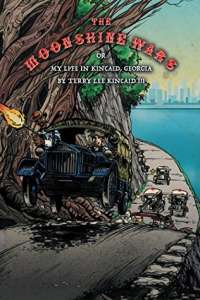★★★½ 
While it is easy to look at the post-Civil War era through a historical and objective lens, the stories of the families who lived through those times are also fascinating, and vitally important. In The Moonshine Wars: Or My Life in Kincaid, Georgia, author Daniel Micko invites readers to get to know one particular Southern family, and takes the time to tell their strange side of the American story.
Stretching from the end of the Civil War through the end of the Roaring Twenties, this multi-generational tale delves into the Kincaid family business, how they rose to prominence, how they managed to get a town named after them, and what mistakes their collective weaknesses led them to. The narrator is called Little T, and his closeness to the story (being the grandson of Terry Lee Kincaid), as well as the fact that he is a child, make it difficult to tell whether he is a trustworthy storyteller.
Over the course of the book, Little T touches on some very sensitive topics, including the volatile race relations in the late 19th century, his family’s treatment and philosophy regarding women and the black community, and the criminal enterprise that kept the family afloat. There is both pride and begrudgingly admitted guilt in the writing, as though, upon reflection, the narrator realizes that his family members weren’t always good people. Even so, he boldly defends their actions and beliefs like any defiant grandson, refusing to openly besmirch his granddaddy’s legacy.
Between telling tales of Klansmen meetings and detailing how and why various family members had been sent to jail, Little T gradually spills the entire story of the Kincaid family. While it is interesting at times, there are many moments and tangents that drag out unnecessarily. Some of the more detailed accounts of the past don’t seem to contribute heavily to the story, and the repetitive use of names in the entire novel can be frustrating and distracting for readers.
In terms of the writing itself, the prose is choppy and abrupt, which may be explained by it being from a child’s perspective, but the subject matter is clearly more adult in many sections. This young person’s viewpoint robs the novel of its ability to reflect and draw conclusions on the events, making the book a long recitation of history, but one in which finding a point or a moral is much more difficult. Not only is understanding the author’s point challenging, but the reading experience is also interrupted many times by glaring editorial errors, spelling mistakes, and repetitive sentence structures that can become monotonous.
Little T is a very thorough narrator, and clearly passionate about sharing his family’s history, but without him taking a stand against the blatant racism, sexism, and backward philosophy espoused by his kin, he doesn’t end up as a particularly likable narrator. There is value to showing how people really think, but that doesn’t make the ideas any less controversial or potentially offensive, even if told from the eyes of a child.
Overall, The Moonshine Wars seems like it could have said something more powerful, but instead chose to avoid any judgment of this particular family, and so refrains from drawing any real conclusions about this period in American history.
Links
Twitter
Amazon
Barnes & Noble
Kobo
Goodreads
STAR RATING
Design
Content
Editing
Get an Editorial Review | Get Amazon Sales & Reviews | Get Edited | Get Beta Readers | Enter the SPR Book Awards | Other Marketing Services























Leave A Comment